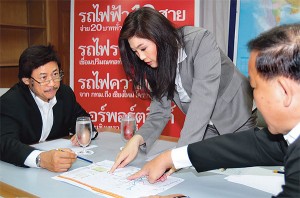 As the date for general elections in Thailand draws ever closer, the complexity of the situation has commonly been acknowledged by Southeast Asian commentators, especially with respect to the unknown status of former Prime Minister Thaksin Shinawatra. This reality was only augmented following recent statements and actions by some of the parties involved this past week. We start with Thaksin, the former PM ousted in a military coup back in 2006. His Red Shirt supporters were the ones who staged protests in Bangkok last year – resulting in over 90 deaths – advocating for Thaksin’s repatriation. But in recent remarks given in an interview with the Australian Broadcasting Corporation’s Lateline program, Thaksin suggested he was anticipating enjoying his retirement, rather than rejoining the political fray. “I still want to be a lecturer,” he said. “That’s my dream. Playing golf. Giving guidance for my children — for their business endeavors. That’s what I really want to do.” Others are more skeptical with respect to the former PM’s plans to hit the links or the classroom anytime soon. Indeed, Thaksin’s comments seemed particularly bizarre in the context of a story in the Bangkok Post three weeks ago which suggested the telecom billionaire was the only political leader capable of leading the Pheu Thai party to victory.
As the date for general elections in Thailand draws ever closer, the complexity of the situation has commonly been acknowledged by Southeast Asian commentators, especially with respect to the unknown status of former Prime Minister Thaksin Shinawatra. This reality was only augmented following recent statements and actions by some of the parties involved this past week. We start with Thaksin, the former PM ousted in a military coup back in 2006. His Red Shirt supporters were the ones who staged protests in Bangkok last year – resulting in over 90 deaths – advocating for Thaksin’s repatriation. But in recent remarks given in an interview with the Australian Broadcasting Corporation’s Lateline program, Thaksin suggested he was anticipating enjoying his retirement, rather than rejoining the political fray. “I still want to be a lecturer,” he said. “That’s my dream. Playing golf. Giving guidance for my children — for their business endeavors. That’s what I really want to do.” Others are more skeptical with respect to the former PM’s plans to hit the links or the classroom anytime soon. Indeed, Thaksin’s comments seemed particularly bizarre in the context of a story in the Bangkok Post three weeks ago which suggested the telecom billionaire was the only political leader capable of leading the Pheu Thai party to victory.
Making the situation even cloudier is that Thaksin’s sister, Yingluck Shinawatra, appears to be the frontrunner for post of prime minister if her Pheu Thai party captures an electoral victory, despite minimal political experience on her part. This has fueled speculation that Yingluck may simply be a surrogate for Thaksin, who many believe still wields the political clout in Pheu Thai, despite living as a fugitive in exile. Yingluck would be Thailand’s first female prime minister should she get her party’s nomination.
Another issue to consider is the platform of the People’s Alliance for Democracy (PAD), or the Yellow Shirts, who were responsible for ousting the post-coup, pro-Thaksin government of Samak Sundaravej following protests in 2008 that ultimately resulted in the shutting down of Bangkok’s international airport for several days. After assisting in the Democrat Party’s accession to power, the PAD has since turned on their former allies and started their own, independent political party. At a PAD rally in central Bangkok last night, an assailant on a motorbike tossed a grenade into the crowd, remarkably not killing anyone but still injuring two people. This comes on the heels of the assassination attempt on the life of Pracha Prasobdee, the Red Shirt supporting, Pheu Thai MP from Samut Prakan in early May.
A recent survey showed Pheu Thai polling at 41% whilst the caretaker government of Prime Minister Abhisit Vejjajiva and the Democrats polled at 37%. If these results were to hold, it would force both parties to attract secondary parties to form a coalition government. One possibility could very well be the PAD, unhappy with the Democrats and responsible for the overthrow of Yingluck’s brother and the breakup of Pheu Thai’s antecedent assembly, the People’s Power Party. Naturally, this would make for a very interesting and potentially explosive scenario.
The United States has also weighed in, with Assistant Secretary of State for East Asian Affairs Kurt Campbell stating bluntly that the situation in Thailand was “complex.” No, really? The U.S. enjoys very warm relations with Thailand including a very profitable trade agreement for both sides. The bond between the two states was also articulated by Secretary of State Hillary Clinton in a birthday address via Youtube to King Bhumibol two years ago.
Violence has never defined Thai politics; indeed, the myriad military coups which have occurred since the transition from absolute to constitutional monarchy in 1932 have been relatively bloodless. The U.S., for its part, does not want the additional headache of a friendly government undergoing the type of civil strife which has transpired across the Mideast during the Arab Spring. There are many different variables in play which makes the Thai elections a fascinating event. Be sure to follow this blog for updated coverage as the July 3rd election date approaches.